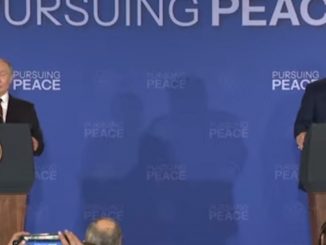
Emmanuel Macron and Sir Keir Starmer have pledged to work ‘more closely’ on nuclear deterrence Credit: Carlos Jasso/POOL/EPA/Shutterstock
| Published July 10, 2025
In a historic first, the United Kingdom and France have agreed to coordinate their independent nuclear deterrents, a move framed by some as a necessary strategic evolution—while others warn it may mark the beginning of a dangerous nuclear escalation in Europe.
🔍 What Happened?
According to official statements and reports from The Telegraph, both nations have signed a joint declaration confirming enhanced nuclear coordination in the face of emerging threats. While each retains full national control of its nuclear arsenal, the agreement signals unprecedented strategic unity between Europe’s only two nuclear powers.
Meanwhile, The Gateway Pundit framed the move as an “ultimate escalation,” suggesting that the joint posture could be seen as a warning to Russia—or even the United States—amid a shifting global security landscape.
🧭 What’s New?
-
Coordinated Deterrence: This doesn’t mean a merged nuclear command. Rather, it’s a political and military alignment, stating that if either nation faces an “extreme threat,” they may respond in sync.
-
National Sovereignty Preserved: Each government—London and Paris—maintains full, independent control of their nuclear weapons.
-
Broader Military Cooperation: The deal is part of a larger UK–France defense agreement, which includes collaboration on missile systems like Storm Shadow and support for jobs and defense innovation in both countries.
🌍 Strategic Context
This comes amid:
-
Growing uncertainty about U.S. commitment to European defense.
-
Increased aggression from Russia and instability across NATO’s eastern flank.
-
Macron’s long-standing ambition for a stronger European defense pillar, especially in nuclear deterrence.
⚖️ Interpretation Split
| Viewpoint | Description |
|---|---|
| Mainstream (e.g., The Telegraph) | Sees the move as a smart, necessary evolution of European defense in light of modern threats. It enhances deterrence without violating national control. |
| Skeptical/Alarmist (e.g., Gateway Pundit) | Frames the coordination as a veiled warning—or provocation—that may further destabilize global nuclear relations and reduce transparency |
 Resulting Effects:
Resulting Effects:
1. Strengthened European Deterrence
-
For the first time, Europe presents a unified nuclear posture without relying solely on the U.S. nuclear umbrella.
-
Sends a clear message to adversaries like Russia, suggesting that any threat to one nuclear power could prompt a coordinated nuclear response.
2. Political Signal of Strategic Autonomy
-
Reinforces French President Macron’s call for “strategic autonomy”—Europe defending itself without depending on American leadership.
-
Undermines fears of NATO fragmentation by recasting European defense leadership within Europe itself (especially post-Brexit).
3. Heightened Nuclear Tensions
-
Critics warn the move could be viewed by Russia, China, or even the U.S. as nuclear escalation.
-
By aligning two nuclear forces, Europe may now appear more provocative—possibly inviting cyber, proxy, or political countermeasures.
4. Complicated NATO Dynamics
-
NATO is based on U.S. nuclear leadership; this deal introduces an independent nuclear axis within NATO, which could create strategic friction.
-
Raises questions: Will other European countries (e.g., Germany, Poland) seek involvement? Will NATO endorse or resist this model?
5. Industrial and Technological Gains
-
Enhanced cooperation on missile systems (e.g., Storm Shadow) and other advanced technologies benefits both nations’ defense industries.
-
Estimated to support ~1,300 UK jobs and improve coordination in joint weapons development.
6. Potential Blueprint for a Pan-European Nuclear Umbrella
-
This pact could evolve into a broader Euro-deterrence model, where non-nuclear states benefit from a shared security guarantee.
-
Opens debate about reforming the European defense architecture—possibly sidelining NATO in the long run.
7. Diplomatic Ripple Effects
-
Germany, long hesitant about nuclear matters, may now reconsider its stance—especially with regional security deteriorating.
-
Could lead to pressure within the EU for a centralized security strategy, including nuclear coordination under an EU framework.
 Bottom Line:
Bottom Line:
The UK–France nuclear alignment may appear, on the surface, as a move to strengthen Europe’s defense—but dig deeper, and it raises serious concerns about sovereignty, NATO cohesion, and long-term strategic consequences.
While the agreement claims to preserve national control, this kind of “coordinated deterrence” walks a fine line. It risks undermining the nuclear balance within NATO by creating a parallel axis of power—one not led by the United States. That’s no small matter, especially with the Biden administration projecting weakness abroad and Europe increasingly drifting toward centralized, Brussels-style military control.
This isn’t just about standing up to Russia. It could be the first major step toward a European nuclear bureaucracy—less accountable to voters, and more aligned with globalist visions of defense autonomy that sideline national interest.
Instead of reinforcing NATO—the world’s most successful military alliance—this deal may fragment it further. The message should be clear: deterrence works best when it’s unified, U.S.-led, and rooted in clear chains of command—not divided between competing visions of European defense independence.
In short, this isn’t just a strategic shift—it’s a political gamble. And the price may be NATO’s unity, clarity, and effectiveness in the face of real global threats.





Be the first to comment